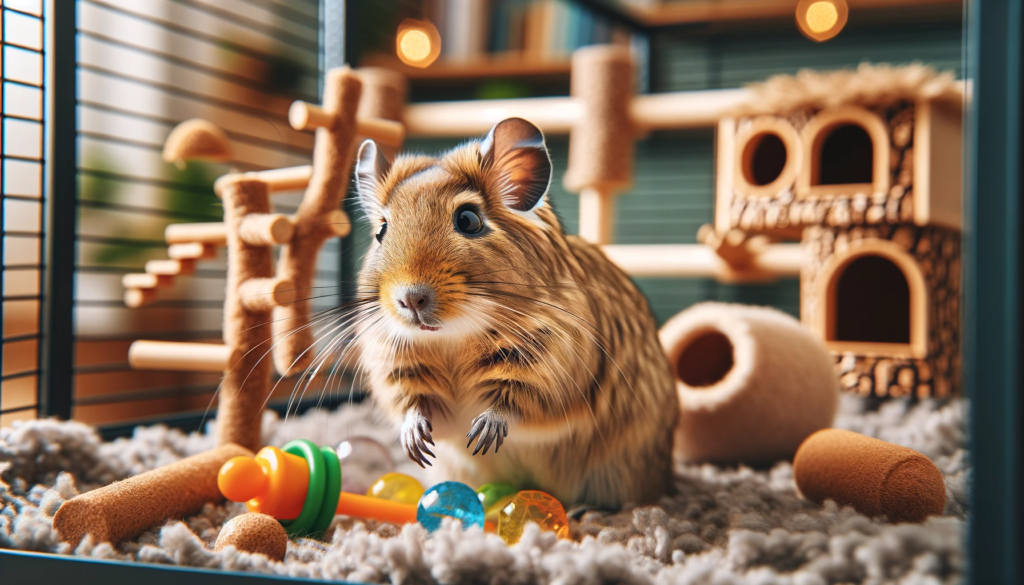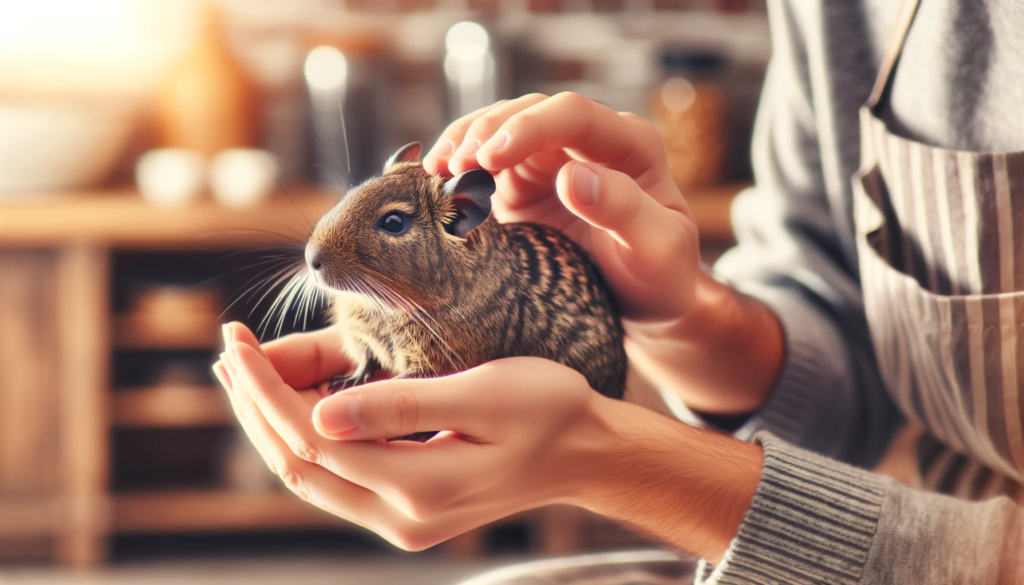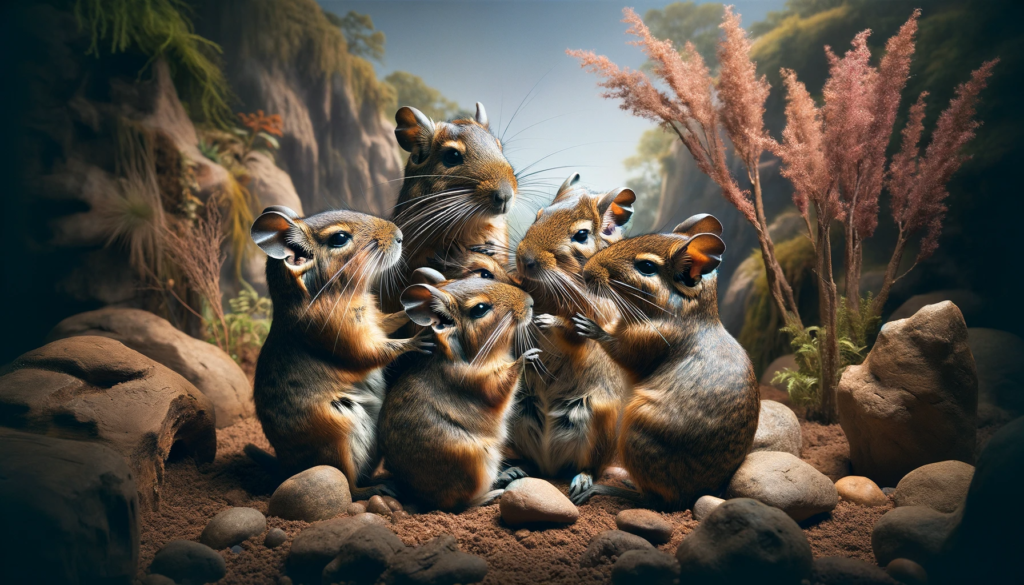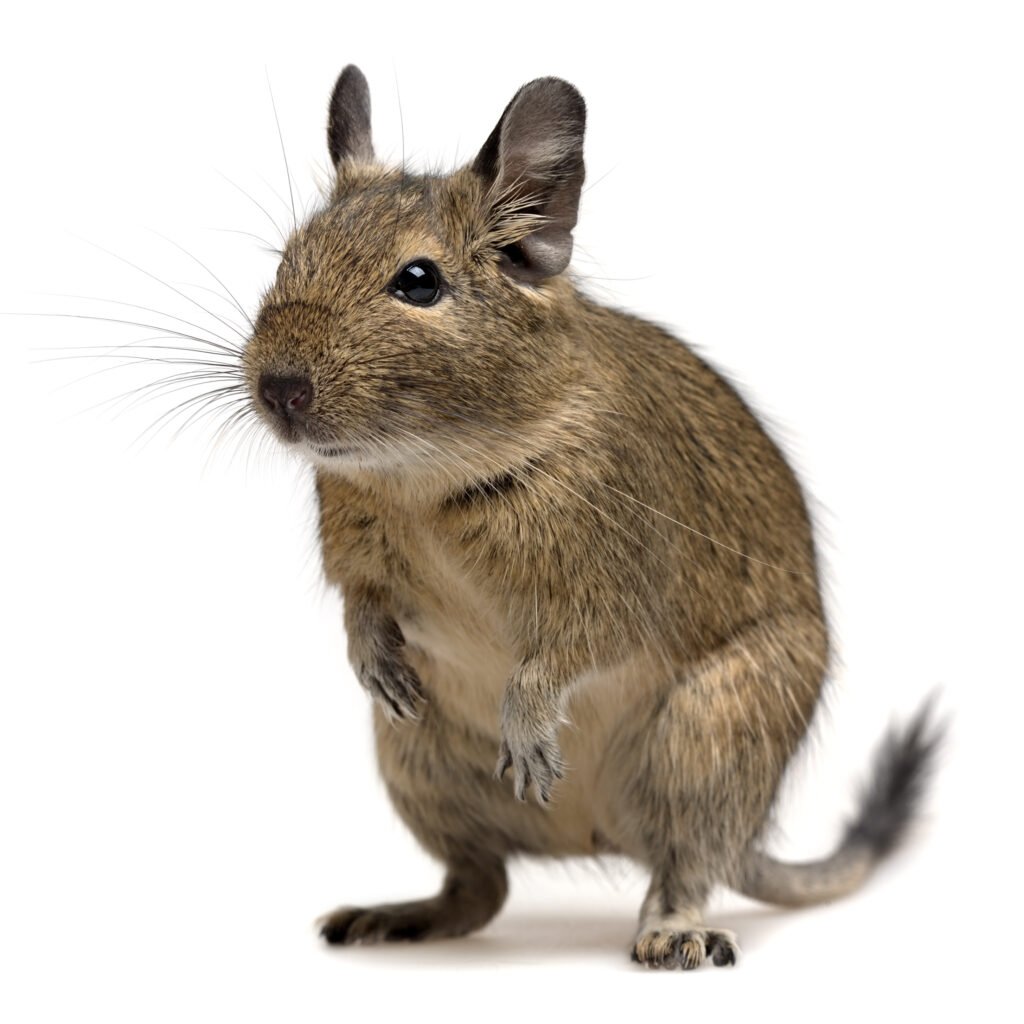Introduction
How friendly are degus? Have you ever wondered? These captivating small creatures, scientifically known as Octodon degus, are more than just adorable. In this exploration, we delve into understanding the sociable nature of degus and how approachable they really are. These tiny, amiable rodents have been winning over hearts globally, but what exactly sets them apart? Whether you’re an experienced degu caretaker, thinking about welcoming one into your home, or simply intrigued by these endearing animals, you’re in for an enlightening experience. Join us as we decode the friendly demeanor of degus and discover the unique qualities of these engaging animals. Prepare for an enthralling adventure into the realm of degus and uncover just how incredibly friendly they truly are!

Understanding Degus: An Overview
So, what exactly is a degu? Picture a small, fluffy creature, a bit like a chubby squirrel with big, expressive eyes. Originating from the central Chilean foothills, these critters are not just adorable; they’re fascinating too! Degus boast a light brown fur coat and have a unique way of communicating – they love a good chat using a range of squeaks and chirps.
These little guys are more than just good-looking; they’re survivors, thriving in a variety of environments from lowland areas to the Andes’ heights. But it’s not just their adaptability that’s impressive; it’s their lifestyle too. In the wild, degus live in close-knit communities, showing us that they value social connections just like we do.
When we talk about degus in captivity, it’s a whole different ball game. They’ve been domesticated for quite some time now and have become popular pets for those who love small, interactive animals. But remember, their social nature doesn’t just switch off because they’re in a home setting. This means if you’re thinking of getting a degu, be prepared for a pet that craves companionship and interaction.
Now that we’ve got a basic picture of what degus are all about, let’s delve deeper into their social lives, shall we? After all, understanding their natural behavior is key to uncovering the secrets of their friendliness. So, off we go into the world of degu dynamics in their natural habitat!
The Golden Rule for Potential Degu Parents: Assessing How Friendly Are Degus
Alright, let’s hop into the fascinating world of degus in their natural habitat. Imagine a bustling community, much like a small town, where everyone knows each other. That’s pretty much what a degu community looks like in the wild. These sociable rodents don’t just live together; they thrive on companionship, forming close bonds with their family members. Degus don’t even bite when they display their friendly behavior.
In these degu towns, you’ll find them living in groups, often made up of families that stick together. They’re like the friendly neighbors you’d love to have. They construct intricate burrows, which are like underground mansions, complete with multiple exits and rooms. Safety and social interaction are key in these burrow communities.

But it’s not just about living together. Communication is a big deal in the degu world. They use a variety of sounds to chat with each other – from high-pitched squeaks when they’re happy to deeper tones for warnings. It’s like they have their own secret language, and it’s pretty amazing how they use it to maintain harmony and keep in touch with their family and friends.
Their social structure is also quite fascinating. There’s a sense of hierarchy, but it’s not as rigid as in some other animal communities. Degus show us that even in the animal kingdom, cooperation and mutual respect can go a long way.
Understanding these social dynamics in the wild gives us a glimpse into why degus might be such friendly creatures. It’s all about community and connection for them. With this in mind, let’s take a leap from the wild into our homes and explore what degus are like as pets. Are they as sociable and just how friendly are degus in a domestic setting as they are in their natural communities? Let’s find out!
Degus as Pets: Discover the Remarkable Friendliness of These Furry Companions
Curious about welcoming a degu into your family? Let’s explore what it means to have these engaging creatures as pets. Degus, with their lively and inquisitive nature, are quickly becoming popular companions for animal lovers. But, there’s a bit more to these furry friends than meets the eye.
The golden rule for potential degu parents:
Remember their love for company. Degus are inherently social animals, so it’s often recommended to adopt them in pairs or groups rather than as solo pets. A single degu might get lonely, and we want our little buddies to be as happy as possible.
Setting up the perfect home for degus is a fun and important task. They need a spacious and stimulating environment. Imagine creating a mini playground for them, complete with climbing structures, tunnels, and cozy nesting spots. This setup not only keeps them physically active but also mentally stimulated.
Diet-wise, degus are herbivores and enjoy a mix of hay, veggies, and specially formulated degu pellets. It’s all about offering them a diverse and nutritious menu to munch on.
Now, the most delightful aspect of having degus as pets is the interaction. These intelligent creatures are known for their potential to bond with their human families. They’re quite responsive and can even learn to recognize their names. Gentle and consistent handling can foster a strong, affectionate bond between you and your degu.
In short, degus offer a unique combination of companionship and entertainment. But how do we gauge their ‘friendliness’? Coming up, we’ll delve into understanding what ‘friendliness’ really means in the world of pet degus and how to nurture this trait in them.
Assessing How Friendly Are Degus: What Makes Them So Endearing?
When we talk about ‘friendliness’ in degus, what are we really referring to? It’s about understanding how these charming creatures interact with us and their environment. Degus, with their outgoing and curious nature, often display behaviors that many interpret as friendly. But let’s take a closer look at what this actually means.
Degus are naturally interactive, showing a keen interest in their surroundings, which includes their human companions. They often exhibit a level of comfort and ease around people, especially when they’ve been gently handled from a young age. This ease can be mistaken for friendliness, but it’s more about trust and familiarity. A degu that happily approaches you or climbs onto your hand is showing trust, a significant aspect of their so-called ‘friendliness.’
Moreover, their playfulness adds to this perception. Degus are active and enjoy engaging in playful activities, both with their kind and with humans. Watching a degu joyfully interact with toys or participate in games can be a delightful experience, further cementing their reputation as friendly pets.
It’s also important to consider individual personality differences among degus. Just like us, each degu has its own unique temperament. Some may be more outgoing and interactive, while others might be shy and reserved. This variance adds to the depth of their character and influences how we perceive their friendliness.
So, when we speak of degu friendliness, it encompasses their trust, curiosity, playfulness, and individual personalities. These qualities combined make them such endearing and captivating pets. As we continue to understand and appreciate these aspects of degu behavior, it becomes clear why they’re cherished as companions hence Degus are very friendly pets to have one.

Factors Influencing Degu Behavior: Shaping Their Social Nature
As we delve deeper into understanding degus, it becomes apparent that several factors play a pivotal role in shaping their behavior and, consequently, their perceived friendliness. Just like us, degus are products of both their environment and their upbringing, and understanding these influences can help us foster stronger bonds with them.
The environment in which a degu is raised significantly impacts its social behavior. Degus that grow up in a stimulating, interactive environment tend to be more outgoing and adaptable. This includes having ample space to explore, a variety of toys and activities for mental stimulation, and, importantly, the company of other degus. A degu raised in isolation, on the other hand, may develop more timid or reserved behavior.
Human interaction is another crucial factor. Degus that are gently handled and interacted with regularly from a young age typically develop a stronger comfort level with humans. This early socialization can make a world of difference in how a degu responds to human companionship as it matures. Consistency and patience in these interactions are key – it’s about building trust and understanding over time.
However, it’s also important to recognize the individual personalities of degus. Just like people, each degu is unique, with its own set of traits and preferences. Some may naturally be more sociable and outgoing, while others might need more time and patience to open up. Respecting these individual differences is crucial in nurturing a positive relationship with your pet degu.
In summary, the behavior and friendliness of degus are influenced by their living conditions, the level of social interaction they receive, and their inherent personalities. By acknowledging and catering to these aspects, degu owners can ensure a happy, healthy, and sociable pet.
Conclusion: Embracing the Unique Charm of Degus and Their Friendliness
As we wrap up our exploration into the world of degus, it’s clear that these small rodents are more than just cute pets. They are complex, sociable creatures with a capacity for building strong bonds with both their kind and humans. From their interactive nature in the wild to their adaptability as affectionate pets, degus offer a unique experience for animal lovers.
Their friendliness, as we’ve discovered, is a blend of trust, curiosity, and individual personality. Each degu is a little world unto itself, full of surprises and endearing qualities. Whether it’s their playful antics, their keen interest in their surroundings, or their ability to form connections with their human families, degus have a special way of capturing hearts.
For those considering a degu as a pet, remember the importance of providing a stimulating environment, companionship, and gentle, consistent interaction. Embracing their individuality and understanding their needs will lead to a rewarding companionship.
In conclusion, degus stand out as delightful companions, not just for their physical cuteness but for their engaging personalities and social dynamics. They remind us that the smallest creatures can bring great joy and enrich our lives in unexpected ways. Whether you’re a seasoned degu owner or new to the idea of these fascinating animals, there’s always something new to learn and appreciate in the delightful world of degus.
References
As we’ve journeyed together through the fascinating world of degus, it’s important to acknowledge the sources that have enriched our understanding. The insights and information presented in this article are drawn from a variety of reputable sources, including scientific studies on rodent behavior, expert opinions from veterinarians specializing in small pets, and the invaluable experiences of degu owners.
These sources provide a solid foundation for our exploration of degu behavior, ensuring that the information is not only engaging but also accurate and reliable. They offer a deeper understanding of these charming creatures, supporting the observations and discussions presented in the article.
For those who wish to delve further into the world of degus, these references are a great starting point. They offer a wealth of knowledge for both current and prospective degu owners, helping to ensure that these small pets are cared for with understanding and compassion.

